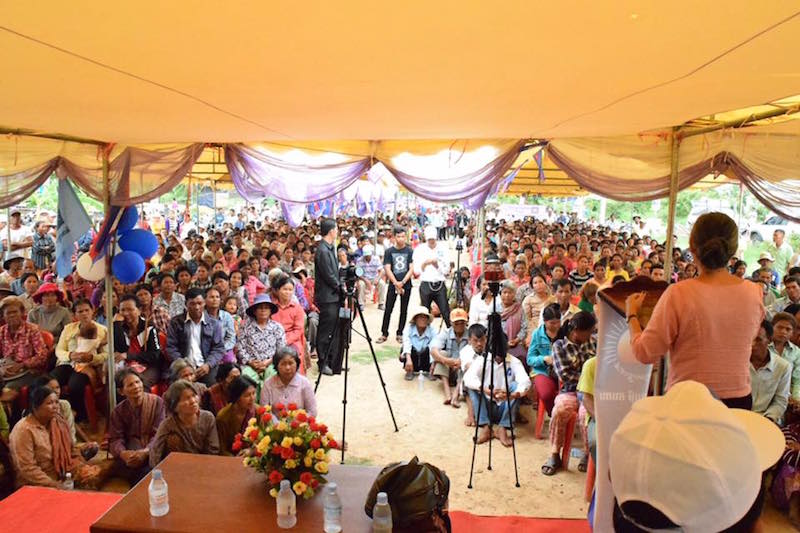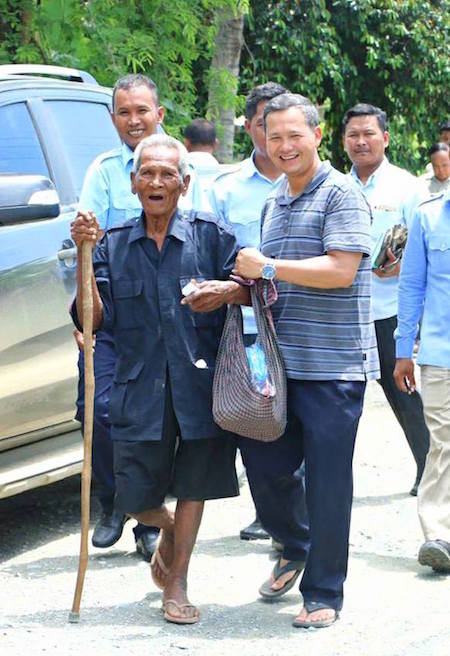As the country enters its first campaign period since the CNRP nearly upset the ruling party in 2013, the opposition party believes momentum is on its side.
“I am looking out in front of me, and there are thousands and thousands of women,” said CNRP Vice President Mu Sochua on Thursday, moments before speaking at a rally in Oddar Meanchey province where organizers had expected a turnout of a few hundred. “We are reaching the grassroots of what used to be the CPP area.”

Ms. Sochua has reasons to be optimistic.
Though Prime Minister Hun Sen initially cast his party’s near-defeat in 2013 as a wake-up call for state reform, there are few signs that the CPP has reinvented itself to address that groundswell of anger ahead of the upcoming commune elections’ official campaigning period, which begins on Saturday. A bipartisan National Election Committee (NEC) has rebuilt voter lists that election observers now deem credible, and instituted other changes designed to avert fraud that critics said used to play heavily in the ruling party’s favor.
Dogged by court cases and legislation it sees as politically motivated, factionalism, and fidgety policy, the opposition party has cleared perhaps the highest hurdle by simply staying intact and successfully fielding candidates in all communes for the June 4 vote.
But there are also several reasons to doubt that the CNRP will be able to reach its goal of capturing control of at least 40 percent of the 1,646 communes in play during the upcoming vote, up from the combined two percent won by the Sam Rainsy Party (SRP) and Human Rights Party (HRP) during the last vote.
“The deck is just stacked in such a way as to make it very hard for the opposition to win [commune] council seats and even harder to win chiefs,” wrote Sophal Ear, an associate professor of diplomacy and world affairs at Occidental College in Los Angeles, and co-author of a study last year on local governance in Cambodia. “Even if they get control of the council (not an easy feat), they would have no money to do anything.”
Up against a formidable CPP party machine whose resources outstrip those of local governments, an election formula that favors incumbents, and voters’ traditional reluctance to risk old patronage relationships, the opposition party faces a long road ahead to both win communes and govern them effectively.

The 2012 commune elections give a hint of the hurdles faced by the opposition.
The SRP and HRP, which merged later that year to form the CNRP, garnered a combined 30.6 percent of the votes, compared to about 60 percent for the CPP.
But because the opposition votes were scattered across many communes, each of which requires a plurality of votes to control the commune chief spot, the CPP was able to convert its votes to control about 72 percent of the councilor seats and a whopping 97 percent of the commune chiefs.
“The overwhelming gains of the CPP are partly explained by technical rather than political reasons,” election monitor Comfrel wrote in its post-election report, including a formula for proportional representation for councilors “that is widely considered to lead to less proportional election results” compared to other systems.
“The structure of commune council election results in situations in which you, as the opposition party, are lucky to get one seat, maybe two seats, but guess what, you still lost the council itself,” Mr. Ear wrote. “The advantage of incumbency is huge.”
For many local leaders, their incumbency stretches back as far as 1979 and even into the Khmer Rouge era, according to a 2008 study by the Cambodia Development Resource Institute (CDRI), which found that voters on the village level across three unnamed communes told researchers they preferred older, entrenched leaders to newcomers with less social capital or fewer connections to patrons.
“Villagers in general fear change and it takes quite a time and effort for new leaders to prove themselves and be accepted,” the study says.
The researchers found that in the three communes they visited, the ruling party was deeply intertwined with the state, with its patrons propping up pagodas, its working groups overseeing new roads, and commune councilors mingling their administrative duties with party campaigning, infrastructure projects and handouts.
Nearly all districts and provinces have a wealthy, powerful CPP patron assigned by the party to pay regular visits, fund and oversee projects and ensure votes for the party.
“The concept of reciprocity is ill used to keep villagers depended so that they vote for those who provide assistance,” notes the CDRI study.
In cases where the commune leaders could tap into a generous national patron, as was the case in one of the three communes visited by CDRI, villagers saw little need to threaten the status quo.
But the authors also said that local leaders who stood by party higher-ups or powerful businessmen in land grabs or corrupt dealings were susceptible to lose their perch—a sentiment social and political scientist Meas Nee said he had been hearing more and more of lately in his provincial work.
“I think people are ready for change,” he said, pointing to widespread internet penetration enabling better informed voters. “Not everybody, but a significant number.”
Assuming Mr. Nee is right, history suggests the opposition commune chiefs will have their work cut out for them.
With coffers in the hands of a central government hesitant to provide funding even for CPP communes in spite of nationwide decentralization plans, opposition-led commune chiefs say they have faced extra obstacles to stay in the loop and finance projects.
An unnamed SRP commune chief interviewed by CDRI said she struggled to find money for projects and was “the last person to know any news.”
Siek Mekong, an SRP commune chief in Stung Treng province, said district and provincial authorities generally offered 50 million riel, or about $12,325, toward annual infrastructure projects, but had refused his requests in recent years to build a new road, accusing him of squandering state funds.
“They always oppose me, or reject my proposals because they do not want opposition members to be here,” he said of the district and provincial councils, who are chosen by commune councilors and therefore swing solidly to the CPP.
Nor does the CNRP have anything to rival the CPP’s working group structure, which has centralized wealth and power over the past three decades.
“If you look at the resources, the ruling party’s local office headquarters looks better than the commune council headquarters,” Mr. Ear wrote. “It’s clear where the money is.”
The CNRP hopes to change that by providing $500,000 worth of funding to every commune—a plan that Ms. Sochua admits is contingent on the party winning next year’s national elections.
“That’s why we’re tying the 2017 message with 2018,” she said. “Otherwise the national budget is in the hands of the ruling party.”
The CNRP is hoping that local voters’ deep connections with the CPP will actually work against the ruling party—that Cambodians have had decades to get to know the government, and don’t like what they see anymore.
“Their only message is fear,” Ms. Sochua said. “Our strategy is door to door, village to village.”
Mr. Ear said he isn’t convinced that the CNRP can translate that effort into a significantly improved performance over 2012.
But Mr. Nee, the social scientist, has a rosier outlook for the opposition, predicting the CNRP to take about 40 percent of the commune chief spots as the CPP sticks to its “old tricks.”
He described recently watching villagers exit a CPP gathering with 20,000 riel, or about $5.
“When they came out, they were laughing,” he said, recalling the sentiment he heard from locals: “You can never change my mind or my heart.”
(Additional reporting by Sek Odom)



